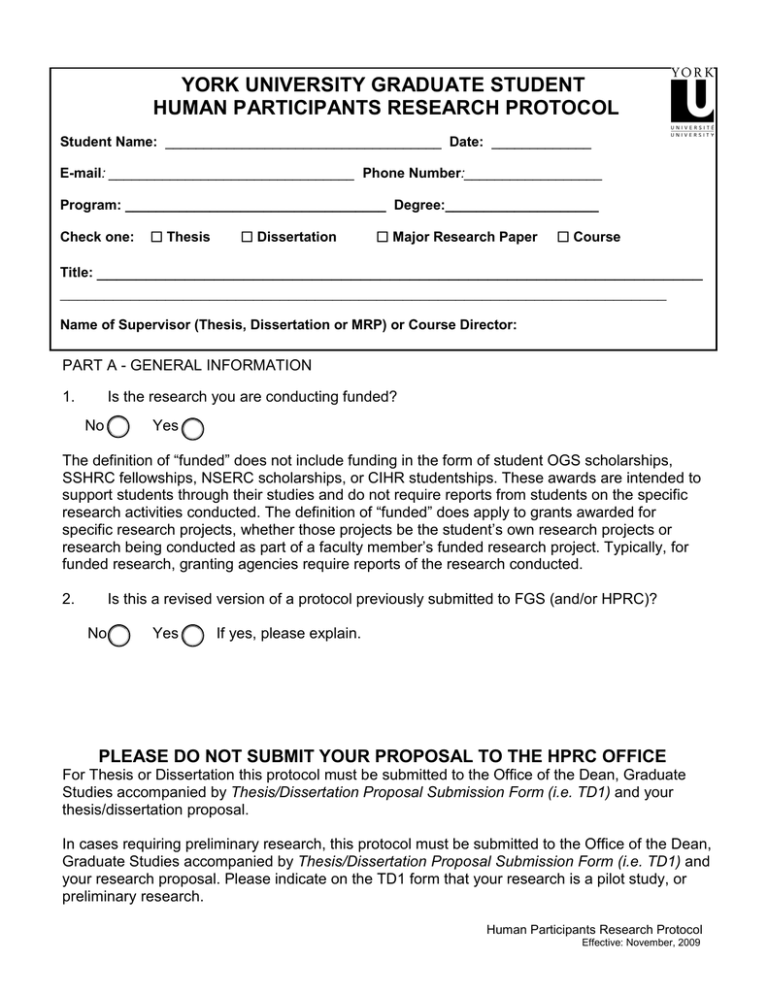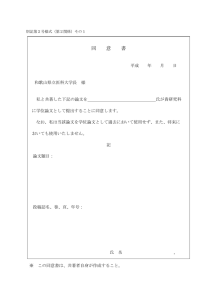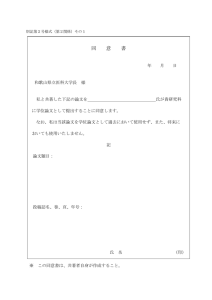FGS Human Participants Research Protocol Form (TD2)
advertisement

YORK UNIVERSITY GRADUATE STUDENT HUMAN PARTICIPANTS RESEARCH PROTOCOL Student Name: ____________________________________ Date: _____________ E-mail: ________________________________ Phone Number:__________________ Program: __________________________________ Degree:____________________ Check one: Thesis Dissertation Major Research Paper Course Title: ______________________________________________________________ _____________________________________________________________________ Name of Supervisor (Thesis, Dissertation or MRP) or Course Director: PART A - GENERAL INFORMATION 1. Is the research you are conducting funded? No Yes The definition of “funded” does not include funding in the form of student OGS scholarships, SSHRC fellowships, NSERC scholarships, or CIHR studentships. These awards are intended to support students through their studies and do not require reports from students on the specific research activities conducted. The definition of “funded” does apply to grants awarded for specific research projects, whether those projects be the student’s own research projects or research being conducted as part of a faculty member’s funded research project. Typically, for funded research, granting agencies require reports of the research conducted. 2. Is this a revised version of a protocol previously submitted to FGS (and/or HPRC)? No Yes If yes, please explain. PLEASE DO NOT SUBMIT YOUR PROPOSAL TO THE HPRC OFFICE For Thesis or Dissertation this protocol must be submitted to the Office of the Dean, Graduate Studies accompanied by Thesis/Dissertation Proposal Submission Form (i.e. TD1) and your thesis/dissertation proposal. In cases requiring preliminary research, this protocol must be submitted to the Office of the Dean, Graduate Studies accompanied by Thesis/Dissertation Proposal Submission Form (i.e. TD1) and your research proposal. Please indicate on the TD1 form that your research is a pilot study, or preliminary research. Human Participants Research Protocol Effective: November, 2009 PART B: RESEARCH INFORMATION 2 1. Are the risks to participants more than minimum risk*? No Yes *The Human Participants Research Committee uses the definition of minimal risk as outlined in the SSHRC/NSERC/CIHR TriCouncil Policy Statement “Ethical Conduct for Research involving Humans” (August 1998): “If potential subjects can reasonably be expected to regard the probability and magnitude of possible harms implied by participation in the research to be no greater than those encountered by the subject in those aspects of his or her everyday life that relate to the research then the research can be regarded as within the range of minimal risk” (p. 1.5). An expanded version of this definition is available from the Office th of Research Ethics (5 Floor, York Research Tower) upon request. 2. Project Description and Rationale: In layperson’s terms, please provide a g eneral and very brief description of the research and rationale (e.g., hypotheses, goals and objectives etc.) Human Participants Research Protocol Effective: November, 2009 3. Participants: a. State who the participants will be (e.g. experimental subjects, interviewees, community members to be observed, etc.). Please provide details about the research subjects that are relevant to your particular research (number, age, sex, students, children, businesspeople, government employees, etc). Also discuss the relationship of the researchers to the prospective subjects (e.g. teacher, parent, advisor, stranger, etc.): 3 b. How will the participants be recruited (e.g., snowball technique, random sampling, previously known to the interviewer, telephone solicitation, etc)? Human Participants Research Protocol Effective: November, 2009 4 c. Will you be offering inducements to participate (e.g., money, gift certificates, academic credit, etc.)? No Yes (If yes, please elaborate) d. What exactly will be required of the participants (e.g., answer a formal questionnaire, respond to interview questions, engage in a free-ranging discussion, undergo any medical procedures, etc.)? If applicable, please attach any research instruments (e.g., sample interview questions, questionnaires, etc. 4. Risks and Benefits: a. What are the risks to the participants? Human Participants Research Protocol Effective: November, 2009 5 b. What are the benefits to the participants? Part C: This section pertains to issues around informed consent. Before completing, please read “Important Statement Regarding Informed Consent” attached to the end of this form. 1. Will you provide a full explanation of the research to the participants prior to their participation? Yes No (If NO, please elaborate) 2. Is substitute consent involved (e.g., for children, youths under 16, incompetent adults)? Yes No 3. Is deception involved? Yes No (If YES, please elaborate below. Please comment on debriefing, if applicable.) 4. Will individuals remain anonymous? Please note that it is expected that participants remain anonymous unless they have given their prior written consent.) Yes No (If NO, please elaborate below. Human Participants Research Protocol Effective: November, 2009 6 5. Will the data be kept confidential? Please note that it is expected that the data will be kept confidential unless the participants have given their permission otherwise. Please also note that if you advise participants that the data will be confidential, you should state that confidentiality will be ensured, within the limits of the law.) Yes No (If NO, please elaborate below). 6. How will data be securely stored and for how long? 7. Please also indicate for how long the data will be securely stored and what will happen to the data after the retention period, that is, will it be destroyed or archived )if archived, indicate where) 8. How will informed consent be obtained? (Check one) Written Informed Consent Document (Please attach draft version) * Letter (please attach draft version) * Oral Informed Consent Document (Permissible only in extenuating circumstances, where written communication is not feasible; draft script of oral informed consent must be provided) *If informed consent is being obtained by letter or verbally, please provide a rational regarding why an informed consent form is not being used. Appendix B provides a checklist for the content of the Informed Consent Document. 9. If you have previously received approval for a research ethics protocol, please attach documentation, as appropriate. Human Participants Research Protocol Effective: November, 2009 7 STUDENT DECLARATION I hereby certify that all information on this form and all statements in the attached documentation are correct and complete. I understand that all human participants in the research must have signed a written consent form or have provided oral consent for their participation in the research. I understand that should there be any change in the research methodology or any increased anticipated risks to human participants, I will advise the Faculty of Graduate Studies; if these changes are not minor, my research proposal may be required to undergo a further ethics review. I understand that any misrepresentation in the proposal or attached documentation may lead to a charge of breach of academic honesty. I also understand that I must retain Consent Forms for two years following the completion of the research. ________________________________________________ Student's Signature ________________________ Date SUPERVISOR DECLARATION I hereby certify that all information on this form and all statements in the attached documentation are correct and complete. I have advised the student that, as specified in Item 6 above and in attached documentation, all human participants in the research must have signed a written consent form or have provided oral consent for their participation in the research. I have advised the student that the Faculty of Graduate Studies will be advised of any changes in research methodology or any increased anticipated risks to human participants and that a further ethics review may be required as a result of such changes. I have advised the student that Consent Forms must be retained for two years following the completion of the research. A TCPS tutorial certificate dated within the past 2 years is attached _______________________________________________ Signature of supervisor (of Thesis, Dissertation, or MRP) or Course Director _________________________ Date Human Participants Research Protocol Effective: November, 2009 8 Important Statement Regarding Informed Consent A. The HPRC has adopted the position that all human participants (e.g., interviewees, research subjects, community members, etc) have the right to be informed of: • the nature of the research (hypotheses, goals and objectives, etc.); • the research methodology to be used (e.g., medical procedures, questionnaires, participant observation, etc.); • any risks or benefits; • their right not to participate, not to answer any questions, and/or to terminate participation at anytime without prejudice (e.g., without academic penalty, withdrawal of remuneration, etc.) • their right to anonymity and confidentiality; • any other issues of which the participants should be aware that are relevant to specific protocols and research projects. B. The HPRC recognizes that the manner the researcher uses to obtain the informed consent varies according to the nature of the research, status of the participants, and culturally-specific norms. Although the HPRC requires that the principles of informed consent (outlined in A. above) be met, it is very flexible in how this consent is obtained. The HPRC will accept any of the three methods outlined below: 1. Informed consent form: The traditional informed consent form is the standard for research involving human participants. This would detail the principles outlined in A. above, and require the participants' signatures. 2. Letter: Where the traditional informed consent form is not appropriate (e.g., interviews with artists or government officials, mass mailed questionnaires, etc.), the researcher may wish to seek permission through a letter inviting them to participate. This letter must nonetheless incorporate the principles of informed consent outlined in A. above. 3. Verbal statement: In some instances, where written communication is not feasible (children, illiterate adults, certain communities), researchers can relay the principles outlined in A. above verbally. The Office of the Dean, Graduate Studies has created instructions and a template to assist graduate students in the creation of informed consent documentation. You can find it online at: http://www.yorku.ca/grads/current_students/ethics.html The Office of the Dean, Graduate Studies has also developed the Informed Consent Document Checklist for Graduate Students to assist in the preparation of appropriate informed consent documentation. C. The HPRC recognizes that researchers completing this protocol may not be at the stage of their research where they are able to provide this information. Nonetheless, the HPRC requires that a "best effort" draft be attached to this protocol. PROTOCOLS THAT DO NOT ATTACH THIS INFORMATION WILL BE RETURNED. November 2009 Human Participants Research Protocol Effective: November, 2009


